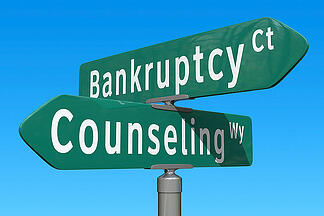Annoyed with debt collector calls?
Here is how to Put a Stop to Debt Collection Calls
Anyone that has had financial troubles and fallen behind in there payments to creditors understands just how frustrating and annoying those calls from debt collectors can be.
Not only are they annoying, but embarrassing as well!
Who wants to hear, "Dad, some guy calling about your credit card bill!"
 Debt collectors are paid to get you to pay up.
Debt collectors are paid to get you to pay up.
They are (for the most part) trained professionals who will use every trick in the book to get you to pay.
Most abide by the law spelled out in the Fair Debt Collection Practices Act, but many do not.
First, it is important for you to know the basics of what a debt collector can and cannot do:
A debt collector cannot call you at all hours of the day. They cannot call before 8:00 AM or after 9:00 PM.
They cannot call you at work if they are told by phone or in writing not to call you there!
A debt collector can call family or friends to inquire about your whereabouts, but the are prohibited from discussing your debts.
What debt collectors CAN'T do:
- use threats of harm or violence
- use profane language
- use threat of legal action if such action is not taken
- give false or misleading information about your debt
- threaten to take any property
- and there are many more... (check out the Federal Trade Commission's Information on how to deal with Debt Collectors).
OK, so you want to put a STOP TO COLLECTION CALLS:
You will need to write a short, legible letter that demands that the debt collector stop calling you immediately.
Although you want to be authoritative, you don't want to be rude or use language you may regret latter.
Remember, most likely, you owe the debt and would like to SETTLE THE DEBT, one of these days.
Located in Portland, Oregon, we have been helping clients stop receiving debt collection calls for over 10 years.
To receive a copy of the letter we use, click below:
Once you have the letter written, you should send it by CERTIFIED MAIL with a RETURN RECEIPT.
This way, you have proof that not only did you mail the letter, but they received it.
WHAT IF Debt Collectors KEEP CALLING????
If the calls don't stop, write down the date, time and try to get name of the person calling.
You will need this later to file a complaint.
You have the right to sue a debt collector in a state or federal court. You can contact your state's attorney general's office to file a complaint. If successful, you may be awarded up to $1,000 per violation!
To file a complaint with the Federal Trade Commission, click here.
Each state has it's own site, and/or method to file a complaint.
For example, if you live in Oregon, click here to file a complaint.
That should do it, but if you would like more information about how to Stop Debt Collectors or would like to know how a debt settlement program could help you, click below:




 Confused about Debt Settlement? Here are some easy to understand, basic information about debt settlement that will help.
Confused about Debt Settlement? Here are some easy to understand, basic information about debt settlement that will help. One of the most commonly asked question we get here at Debt Relief NW, Inc. is…
One of the most commonly asked question we get here at Debt Relief NW, Inc. is… If you have an old credit account that has been placed with a collection agency, you may be able to settle that debt for less than the balance.
If you have an old credit account that has been placed with a collection agency, you may be able to settle that debt for less than the balance.

 Debt collectors practice abusive tactics everyday, but what JPMorgan/Chase did in California got them in serious trouble with the State Attorney General!
Debt collectors practice abusive tactics everyday, but what JPMorgan/Chase did in California got them in serious trouble with the State Attorney General!




